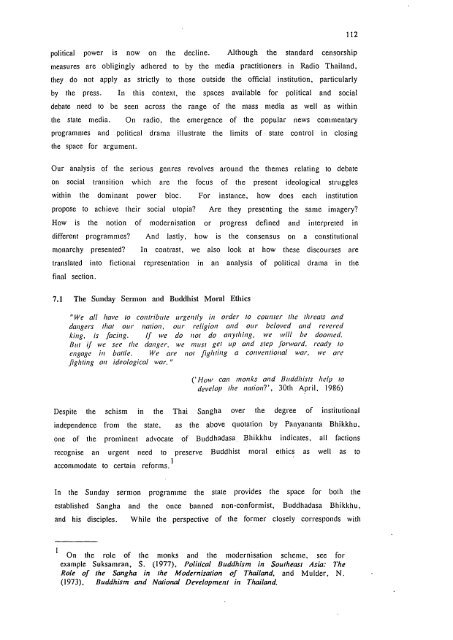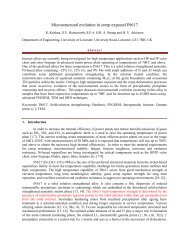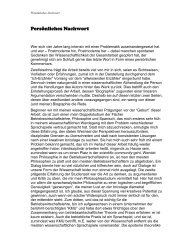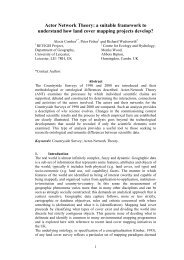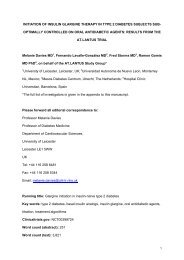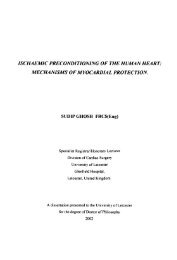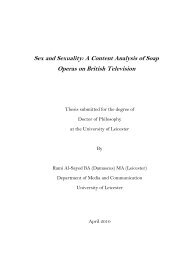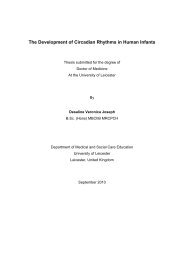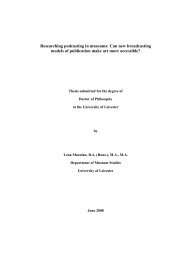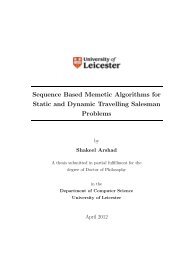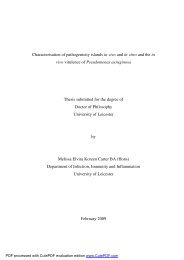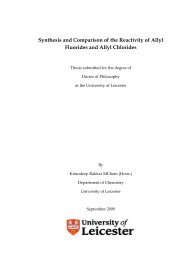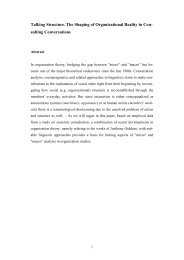iieiiei1eWrkers - Leicester Research Archive - University of Leicester
iieiiei1eWrkers - Leicester Research Archive - University of Leicester
iieiiei1eWrkers - Leicester Research Archive - University of Leicester
Create successful ePaper yourself
Turn your PDF publications into a flip-book with our unique Google optimized e-Paper software.
political power is now on the decline. Although the standard censorship<br />
measures are obligingly adhered to by the media practitioners in Radio Thailand,<br />
they do not apply as strictly to those outside the <strong>of</strong>ficial institution, particularly<br />
by the press. In this context, the spaces available for political and social<br />
debate need to be seen across the range <strong>of</strong> the mass media as well as within<br />
the state media. On radio, the emergence <strong>of</strong> the popular news commentary<br />
programmes and political drama illustrate the limits <strong>of</strong> state control in closing<br />
the space for argument.<br />
Our analysis <strong>of</strong> the serious genres revolves around the themes relating to debate<br />
on social transition which are the focus <strong>of</strong> the present ideological struggles<br />
within the dominant power bloc. For instance, how does each institution<br />
propose to achieve their social utopia? Are they presenting the same imagery?<br />
How is the notion <strong>of</strong> modernisation or progress defined and interpreted in<br />
different programmes? And lastly, how is the consensus on a constitutional<br />
monarchy presented? In contrast, we also look at how these discourses are<br />
translated into fictional representation in an analysis <strong>of</strong> political drama in the<br />
final section.<br />
7.1 The Sunday Sermon and Buddhist Moral Ethics<br />
"We all have to contribute urgently in order to counter i/ic threats and<br />
dangers that our nation, our religion and our beloved and revered<br />
king, is facing. If we do not do anything, we wi/I be doomed.<br />
But if we see i/ia danger, we must gel up and slap forward, ready /0<br />
engage in battle. We are not fighting a conveniional war, we are<br />
fighting an ideological war.<br />
('I-low can monks and I3udd/iists lie/p to<br />
develop the nation?', 30th April, 1986)<br />
Despite the schism in the Thai Sangha over the degree <strong>of</strong> institutional<br />
independence from the state, as the above quotation by Panyananta Bhikkhu,<br />
one <strong>of</strong> the prominent advocate <strong>of</strong> Buddhadasa . Bhikkhu indicates, all factions<br />
recognise an urgent need to preserve Buddhist moral ethics as well as to<br />
accommodate to certain reforms.<br />
In the Sunday sermon programme the state provides the space for both the<br />
established Sangha and the once banned non-conformist, Buddhadasa Bhikkhu,<br />
and his disciples. While the perspective <strong>of</strong> the former closely corresponds with<br />
On the role <strong>of</strong> the monks and the modernisation scheme, see for<br />
example Suksamran, S. (1977), Political Buddhism in Southeast Asia: The<br />
Role <strong>of</strong> the Sangha in the Modernisalion <strong>of</strong> Thailand, and Mulder, N.<br />
(1973), Buddhism and National Development in Thailand.<br />
112


